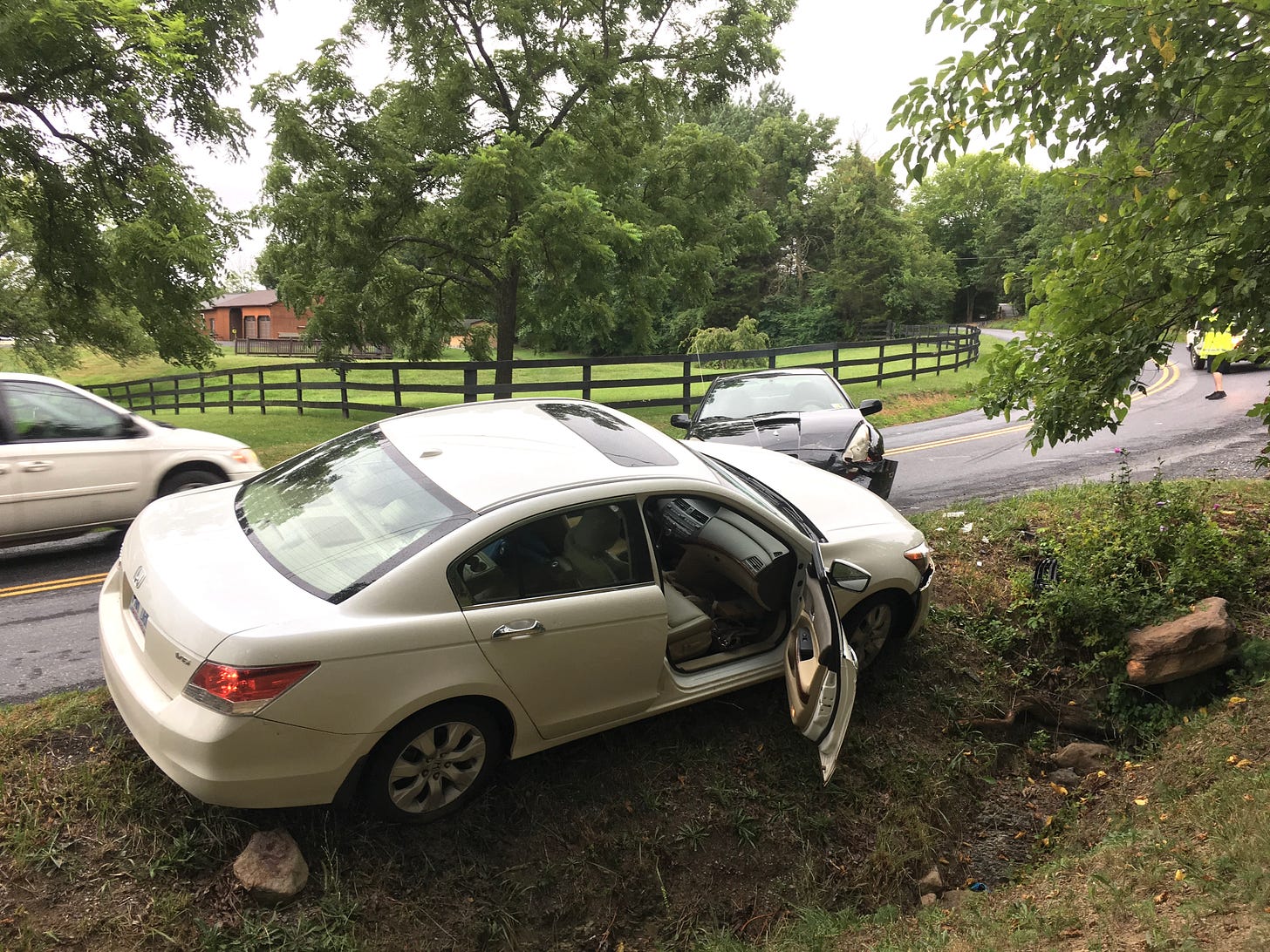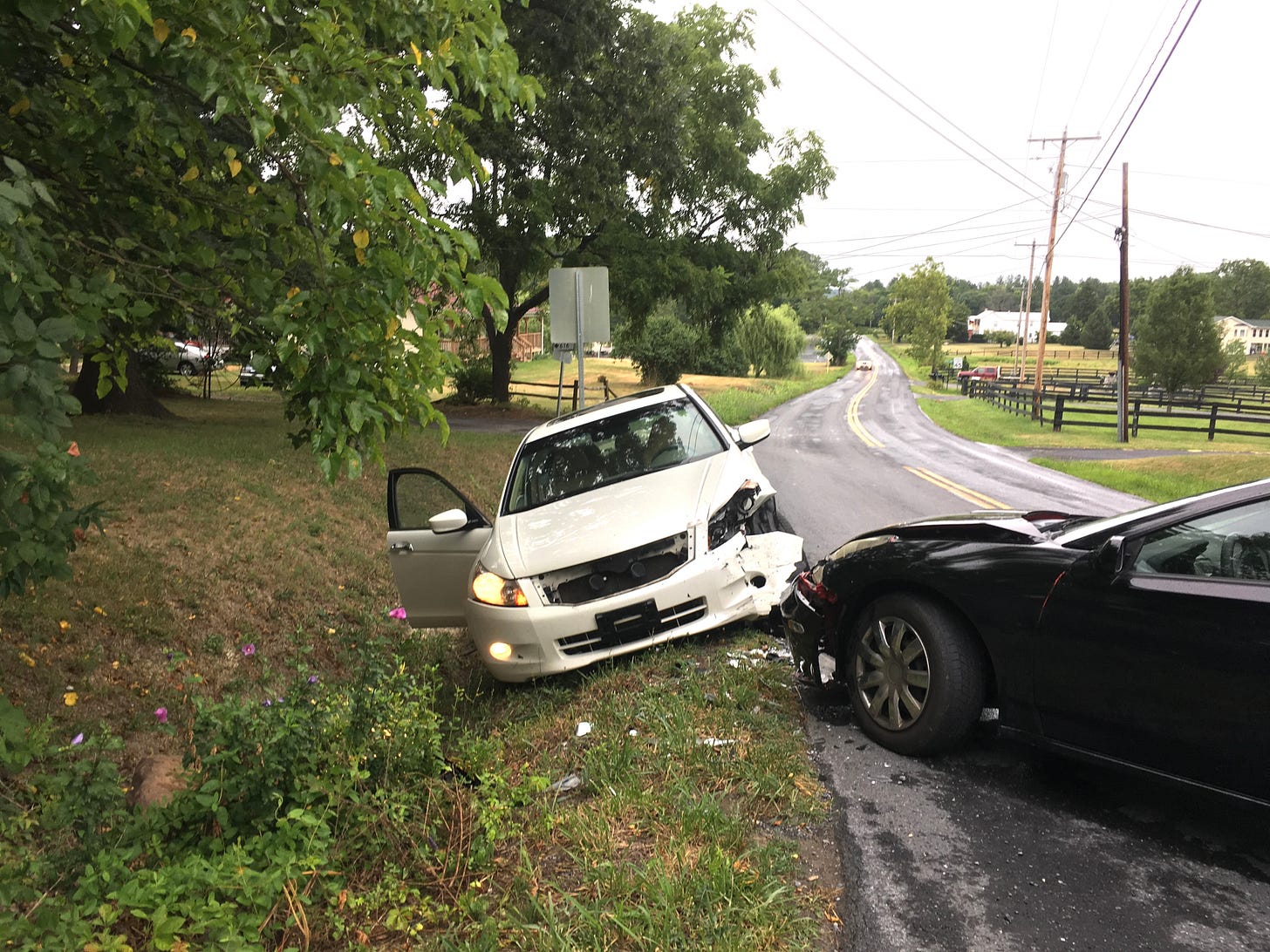More on triggers
because they just keep coming
One day while we were in Colorado a couple of months ago, we went to the local REI to get Ben a pair of hiking shoes. When it was time to leave, I pulled out of the parking lot and we were sitting at a red light. I was in the left-turn lane waiting for a green arrow to turn onto a six-lane highway—three lanes in each direction.
There was a little black car in the left-turn lane of the main road waiting for oncoming traffic to go by before he could turn onto my road.
The thought flashed in my mind that he was going to turn left in front of an oncoming car and I was going to see a huge crash right in front of me. It was suddenly overwhelming and my heart rate sped up and I held my breath.
In my head, I knew it was just an intrusive thought and I tried to remind myself of that. I’ve had a lot of these since my accident, and they are a well-known after-effect of trauma. Yet my body reacted as if the scenario were real.
Then, amazingly, the little black car actually started turning when a car was coming through the intersection toward him, and my “just an intrusive thought” actually was happening in real-time. Only in reality, he hit his brakes just in time to not be creamed by the car coming through.
All of this happened in probably less than two seconds, and suddenly I was gasping and crying and almost yelling, “I knew he was going to do that! I knew it before it happened!” and I kept saying over and over, “I knew that was going to happen! I saw it happening in my mind before it even started! How did I know it was going to happen??” I was so freaked out by the fact that I saw it happening before it actually happened, and I was panicking while my arrow turned green.
Now that I am over five years past my accident and have processed it multiple times in EMDR therapy, I still get startled easily but I get over faster than I used to. Typically if I’m driving down the road and something scares me, I feel pretty much back to normal in a few minutes, where it used to take a full day or more. In this instance in Colorado, it took a lot longer. It was more than just a startle. It was a full panic attack.
We pulled into the parking lot across the street and sat there, me shaking and crying and trying to make sense of what I saw. Not only was I startled, but I knew it was coming before it happened. How could that be? What on earth?
I knew before it happened.
We’ve talked about triggers before (read it here ICYMI), and they are tricky things. We never know when one will pop up and how it will present itself or how our nervous systems will react. It has taken me a lot of weeks of thinking about this event to figure out why it was such a trigger.
I don’t know how I knew it was coming. Ben thinks maybe because I am so hyper-aware of everything around me when I’m driving that I actually imagine what might happen if someone does something stupid. That’s an intrusive thought, and it makes total sense.
But I knew it was coming and that knowing was the actual trigger.
When I was hit head-on, I was driving up a winding road toward my brother’s house, thinking about the trip I was coming home from and the visit I’d just had with my parents. I saw the little black car come around a curve way too fast and immediately knew the driver was not in control. I heard his skidding from the moment I saw him.
He was coming downhill too fast and was going to have to make an opposite curve to avoid hitting me and I knew he wasn’t going to be able to make the turn. I knew he was going to keep skidding in my direction. There was no place for me to go to avoid being hit and I knew a few very long seconds beforehand that he was going to hit me. I knew.
Just knowing was the trigger, coupled with the fact that it was a little black car. My body, my nervous system, remembered what it felt like to know I was in danger and it reacted in the same way: panic, crying, shaking, hyperventilating.
When you experience a trauma, your nervous system and your body do whatever they do to try to keep you safe. That’s how we were created: to be a self-saving machine. Your brain’s number-one priority is keeping you alive. So our brains file all the details away in the “not safe” file, so that when something similar happens in the future, they have a pre-made template of what to do, what worked to keep you alive last time. Then they follow that filed protocol and voilà, you have a reaction just like the initial one.
Am I thankful for triggers? Not really. I do appreciate that my brain works hard to keep me alive, but I wish I could figure out how to delete this particular “not safe” file permanently. It’s kind of like deleting an app off your phone. The app itself is gone, but there are little hidden remnants that remain, so that if you go to the app store to get that app again, your phone remembers that you had it once and it doesn’t need 82-factor authentication to download it again. It remembers. Your brain is better than an elephant’s—it never forgets.
This is part of my new-and-improved version of what it means to heal from trauma. Since I know my brain and body and nervous system will always remember, the goal can’t be to forget it completely. That’s unrealistic. It won’t ever happen.
Instead I learn to live with the trauma and the triggers and the intrusive thoughts, and I learn how to live with them. This is what therapy is for. It’s where I learn strategies to deal with events like this and others that come up, and I hate to think where I’d be without it.
Here’s what I want you to know: going to therapy doesn’t mean you’re weak or ungodly or a less-than person or Christian. It means you’re smart enough to know there’s a better way to go through life and you’re willing to ask for help to learn it.



